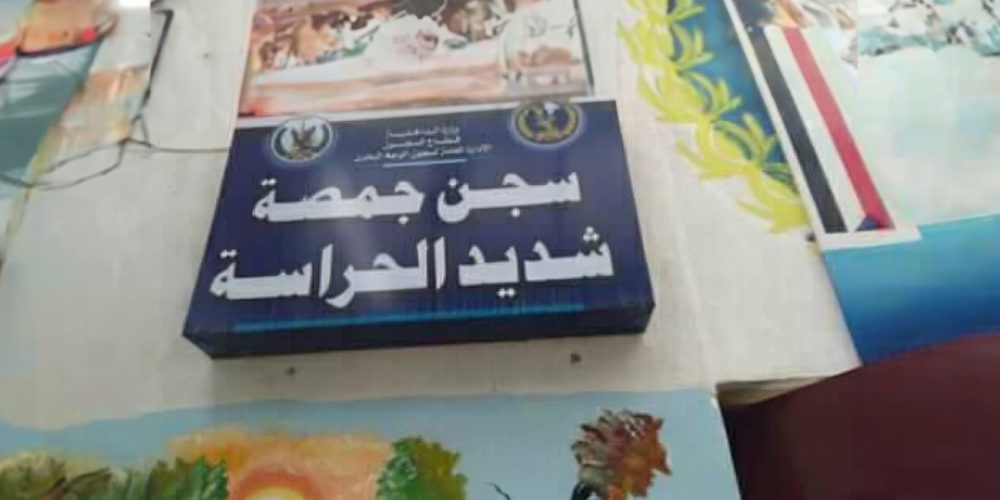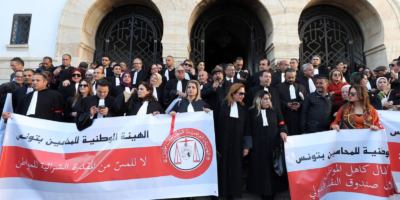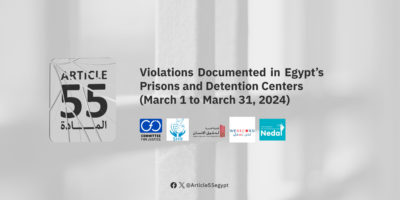The Committee for Justice (CFJ) has documented human rights violations against political detainees in the maximum-security Gamasa Prison in Dakahlia Governorate, Egypt. On March 10, 2024, special forces belonging to the Egyptian Ministry of Interior, under the command of officers from the Egyptian Prison Service and the National Security, stormed the cells of politically detained individuals in Ward 6 of Gamasa Prison.
During the assault, the forces randomly fired tear gas, endangering the lives of many detainees. They stormed the ward’s rooms, brutally and indiscriminately assaulting a large number of detainees by beating and dragging them while they were asleep; before forcibly taking 10 of them out of the ward, handcuffing them, and forcing them to sit in a squatting position for 4 hours in preparation for their forced relocation to another distant prison.
After that, a decision was issued by the Prison Service – in violation of its legal regulations – to deport all of the following: The detainees, Hanzala Al-Mahi (from Damietta Governorate), Ahmed Hamzawi (from Cairo Governorate), Mahmoud Abdel Samie Al-Aswany, and Al-Sayyid Al-Deeb (from Sharkia Governorate). The detainees were taken to Borg El Arab Prison in Alexandria, where they were received by the prison’s National Security Officer, Hamza Al-Masry, and an assistant. They were placed in isolation cells for a week, then placed in solitary confinement, and were banned visitation until today, in violation of prison regulations.
Furthermore, three other detainees: Abdel Aziz, Eid, and Ahmed Kamel “known as Oka,” were forcibly relocated to Wadi El-Natrun prison, where their families were allowed to visit them.
Additionally, the security personnel confined detainees Mohsen Gamal, Mohamed Zakaria, and Reda Tawfik to isolation cells within the prison. The following day, they were transported to the high-security Minya prison in southern Egypt. This transfer involved a harrowing journey aboard what is infamously termed the “death trip.”
Last January, CFJ documented the miserable conditions and blatant violations faced by politically detained individuals in several prisons in Egypt, including Badr 3 prison located 70 kilometers northeast of the capital, Cairo. This prompted them to declare their intention to go on a hunger strike due to being deprived of their basic rights to communicate with their families, being denied the opportunity to exercise or to be exposed to sunlight, amidst threats of disease spread due to overcrowding and denial of exit from the cells.
Similarly, in the New Valley prison or “Death Prison,” as detainees and their families call it due to the harsh living conditions inside, CFJ reported the spread of skin diseases within the
prison due to the prison administration’s prohibition of bringing in personal and general hygiene items from outside the prison during visits, along with the insufficiency of hygiene supplies allocated to prisoners. Intense overcrowding in the cells and the twelve wards of the prison, combined with the inadequate quality of drinking and shower water, has significantly led to an unhealthy environment. Detainees also reported that the prison administration deliberately withholds treatment from those who show symptoms of contagious skin diseases, leading to their spread among the detainees.
Several detainees in the prison mentioned that the reason behind the prison administration’s prohibition of entering medicines or general and personal hygiene items is allegedly their fear of the possibility of their use in suicide attempts by some detainees; due to the tragic conditions enforced by the prison administration.
In February, CFJ reported that political detainees in Wadi El-Natrun Prison (Rehabilitation 2) started a partial hunger strike. Their protest aimed at highlighting the dire conditions of their detention, the prison administration’s strict approach during family visits, and the intentional health care denial.
According to CFJ, the prison authorities had banned the entry of food and clothing aimed to protect the political detainees from the severe cold. This, along with poor cell conditions and the lack of windows, caused a surge in respiratory illnesses and worsened the mental health of the detainees. Additionally, the prison administration’s refusal to allow the entry of medication for those with chronic illnesses put their lives at risk, sometimes even resulting in death for those in critical health conditions.
CFJ highlights that the treatment of political detainees in Egypt has not changed, with the authorities continuing to use mainly strict security approach. CFJ believes that to address this issue, it’s essential to pressure Egyptian authorities into respecting the detainees’ fundamental human rights, as outlined in the international treaties and covenants to which Egypt is a signatory.
In light of the above, CFJ holds the Gamasa Prison’s administration accountable for the political detainees’ safety, unequivocally condemning the violations and assaults they have faced. It expresses strong solidarity with the detainees, stressing that denying them basic human rights is both inhumane and illegal, necessitating immediate action. CFJ calls for transparent and swift investigations into these violations, ensuring those responsible are held accountable and that such impunity is not tolerated.
CFJ further calls on the Egyptian Prison Service to abandon its use of isolation and deportation as tactics against political detainees, urging the initiation of dialogue with them. It also calls for an end to discriminatory practices against these detainees, emphasizing the importance of upholding their fundamental human rights and opening channels of dialogue with them.
Moreover, CFJ urges the Egyptian prosecution to actively inspect detention facilities and prisons to prevent further violations. It also calls on the Egyptian National Council for Human Rights to truly and effectively monitor detainees’ conditions, moving beyond mere propaganda campaigns that serve the authorities, and to advocate for the victims





